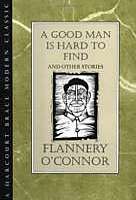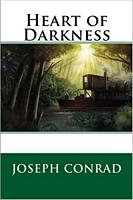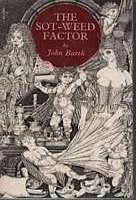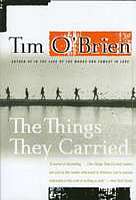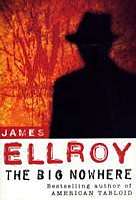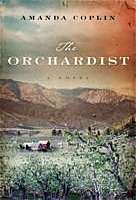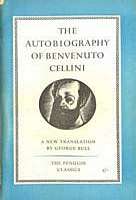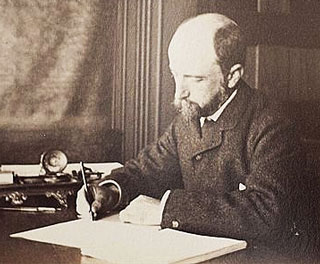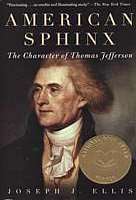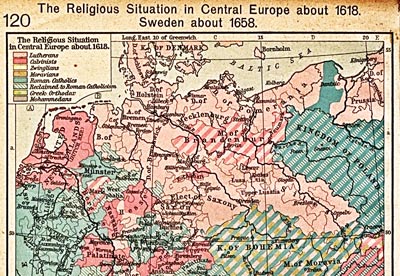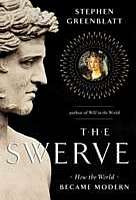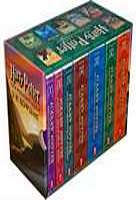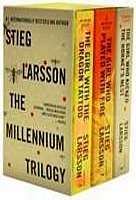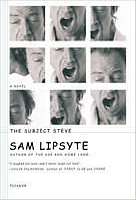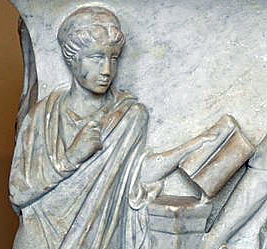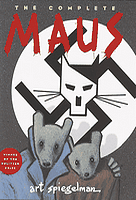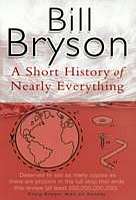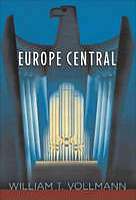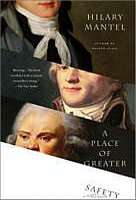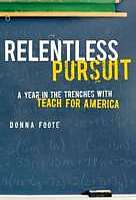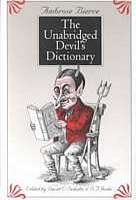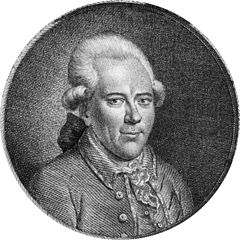 Literature
Literature
 [A great nation is saved] by speaking, writing, voting reasonably; by smiting corruption swiftly; by good temper between parties; by the people knowing true men when they see them, and preferring them as leaders to rabid partisans and empty quacks -William James
[A great nation is saved] by speaking, writing, voting reasonably; by smiting corruption swiftly; by good temper between parties; by the people knowing true men when they see them, and preferring them as leaders to rabid partisans and empty quacks -William James Tyranny ... finds it impossible to continue to live with science. -Robert Oppenheimer, Physics in the Contemporary World, A.D. Little Lecture 1947
Tyranny ... finds it impossible to continue to live with science. -Robert Oppenheimer, Physics in the Contemporary World, A.D. Little Lecture 1947Weebcentral Library
A list of the books in the personal library of the Oregon Scribbler.A good man cannot be found
Within Flannery O'Conner's short story collection, A Good Man is Hard to Find and Other Stories, a good man is not just difficult to find, but impossibly so. Thank God I am not Flannery O'Connor. I would not trade her ability to tell a story, and she was uncommonly good in some ways, for her brutal and dismissive view of the world. Harshness, of circumstance and character, formed her viewpoint; what is also redeeming found little place in her stories. It appears in O'Connor one can only find redemption outside of humanity, and that is dispensed grudgingly, with the great violence of the Old Testament God.
Heart out of darkness
In Joseph Conrad's classic novella, Heart of Darkness, the sailor Marlow serves as the author's version of Coleridge's Ancient Mariner, compelled to tell his story of conscience to whatever audience he finds. The story he tells is indeed dark, and indeed about the heart, albeit mostly the lack thereof. Conrad takes apart the European colonial enterprise, particularly the carving-up of Africa in the nineteenth century, and strips bare all of the tales of adventure from those times and places, along with the high-flown language of imperialism which was used to mask the utter barbarity of the undertaking.
Candide in Maryland
The Sot-Weed Factor is a satirical tour-de-force with so much going on that I could hardly follow it all. The style is bawdy, witty, and often funny, a full-fledged imitation of a 17th century novel, complete with the full English vocabulary of the times, which by itself is a welcome challenge to parse. It has been described as a picaresque novel, and the main character is Eben Cooke, an over-educated and under-employed poet and virgin, a Candide-like character constantly bewildered by the world, swept along by events, too curious to make a decision about anything.
The burden of combat
O'Brien's Vietnam combat experience and facility as a writer helped to illuminate the pervasive fear he and other combat veterans experienced, and the resulting distortions it had on their behavior. I found it difficult and compelling reading. It is a set of related vignettes, short-story-like, that explore the short bursts of violence and the long periods between fighting that weighed upon the soldiers of this combat infantry platoon. The loss of a comrade produced deep and long-lasting emotional effects for these men, including fantasies inspired by perhaps mis-placed guilt: 'If I only had done this, my comrade would still be alive.'
Nightmares in L.A.
I decided to read one of James Ellroy's gritty L.A. noir detective novels. His Black Dahlia and L.A. Confidential were both made into films, the latter a very good one. Unfortunately, The Big Nowhere turned out to be not just gritty, but pornographically cruel and soulless.
The heart of the orchard
This is a well-structured novel of grief and solitude and of the damage of indifferent manipulation and violence, balanced against the friendship and care that can heal. The author depicts the inner life of people who are mostly isolated, via the point of view of an orchardist, as lonely, sometimes peaceful, and sometimes self-delusional or unaware.
I, Benvenuto Cellini
Benvenuto Cellini was a master Florentine goldsmith and sculptor who lived and worked during the time of the High Italian Renaissance, and was also, by his lights, tougher and craftier than anyone around him, could take on many men with a sword and live to tell the tale, was a great lover, and so on. His is the most ebullient autobiography I have read, and so wonderful, and so full of life!
Voltaire is a sharp kick in the pants
Voltaire always had his wits about him. When once a visitor arrived, announcing that he had just come from a visit to another well-known writer, Voltaire offered the opinion that the aforementioned writer was a man of talent, and the visitor replied that that writer did not hold the same opinion of Voltaire, to which Voltaire retorted, 'We could both be wrong.'
Can precision in writing be attained?
I was reading a recent article by Andrew Sullivan, who asks the question: "Does punctuation matter?" The discussion was nominally about internet and texting abbreviation in both word and thought, but raised other questions to me:
Does precision in writing matter? If so, when does it matter? These are devilish questions.
Jefferson’s legacy
Joseph Ellis provides us with an ambitious analysis of the compartmentalized mind of Thomas Jefferson. Jefferson was extraordinarily adept at saying and writing, apparently believing, and doing things that were paradoxical and often diametrically opposed to each other. Ellis suggests that this helps to explain his enduring following by just about every political persuasion in the United States, and even abroad: Anyone can find in Jefferson something that supports one's ideology, especially if they studiously ignore, in perfect Jeffersonian fashion, the things Jefferson said or did that would negate their ideology.
Is religious tolerance religious freedom?
 The ensuing religious fragmentation of Western Christendom following the advent of the Reformation created fissures in the fabric of European society so large that, after a century of warfare, borne by the exhaustion of bitter hatred and its accompanying destructiveness, the only option left for a more peaceful existence was the grudging co-existence of groups with religious differences.
The ensuing religious fragmentation of Western Christendom following the advent of the Reformation created fissures in the fabric of European society so large that, after a century of warfare, borne by the exhaustion of bitter hatred and its accompanying destructiveness, the only option left for a more peaceful existence was the grudging co-existence of groups with religious differences. Swerving into modernity
Stephen Greenblatt's book The Swerve: How the World Became Modern is an excellent tale of the influence of Epicurus on the modern way of thinking. Epicurus spoke of change in terms of a 'swerve'; the author's allusion to a swerve otherwise is to the narrow and chance survival during the Renaissance of Lucretius' poem De Rerum Natura, a rumination and celebration of all things Epicurean, and whose influence in subsequent Western thought represents a giant swerve in cosmology, religion and natural philosophy away from Plato and Aristotle and towards Epicurus.
Imagination nonpareil
This is some of the most imaginative writing I have read since perhaps Tolkien's Lord of the Rings trilogy, or some of the classic science fiction of Asimov and Herbert.
Lizbet Salander, meet Inspector Maigret
Lizbet, the Girl with the Dragon Tattoo, carries the Millenium Trilogy. She is a private investigator, a severely withdrawn, highly intelligent young woman who has been terribly abused, both by her father and as a ward of the state. Lizbet trusts no one, and has developed world class computer hacking skills which serve her in good stead in her job as a private investigator and beyond. She teams up with an older investigative journalist, the fruit of said union providing a broad view of two generations of Swedish culture.
The secret world sharply rendered
This is a long historical novel that dares to write with some depth around the subjects of cryptoanalysis, mathematics, computers, and operating systems. It is full of insights about the technology, about those who live that technology, and about the cultures they inhabit.
(Post?) Modern tale of mortality
Is the Subject Steve dying? Aren't we all dying? Is the Subject Steve actually Steve?
The art of writing? Just get started
I was talking to a friend about the difficulties of writing, and so gave some thought to my own writing process. I have often felt stymied in getting started writing, both in business, of which I did a large amount, or privately; I enjoy writing, and sometimes can write freely and fairly quickly, but the norm is that I struggle to start. My most usual technique is to write a set of scattered notes down, anything, and then revisit it and start shaping it. Most of my more serious “essays” started in one direction, and are in many ways unrecognizable when I am done, precisely because one idea or phrase begets another.Unforgettable, complete Holocaust story
If you were looking for just one story that would give you some sense of the personal impact of the Holocaust on its victims, survivors and their families, this is it. Spiegelman's cartoon version of his father's life before, during and after the Holocaust, of which he was a survivor, provides a more direct, complete and highly visual means of telling the story. Maus draws you close, and with each panel, you feel the emotional impact of this terribly difficult and sad world.
Taking fundamental science personally
Bryson has produced a brilliant exposition on fundamental science that is highly accessible and engrossing for any good reader. The author covers many topics of physics and astrophysics, including the origins of the universe, nuclear physics, and the origins and geological development of the earth.
Wandering Mennonites
The Blue Mountains of China is compelling and candid historical novel that tells the story of a set of Mennonite immigrations from the Ukraine SSR to Siberia, Canada, Paraguay, and briefly, China. The novel begins with a series of loosely connected chapters which move forward in time, and focus on i
Totalitarian Zeitgeist
William Vollman's Europe Central is a layered novel that provides various perspectives of World War II through the thoughts and activities of selected historical actors from Nazi Germany and the Soviet Union, including Käthe Kollwitz, Kurt Gerstein, Dmitri Shostakovich, General Paulus and General Vlasov, among others. Each character carries their particular tragedy forward within the context of the times and the two totalitarian regimes.
Storming the Bastille, then laundry
'Today we stormed the Bastille; I got there late; I heard it was bloody. Then I went home and had an argument with my mistress about the laundry. She spends too much time gossiping with the concierge. Hmmm, what's that I smell for dinner?'
Such parody is a little harsh, but it serves to underline the overall pedestrian nature of this historical novel; the author's subject deserved better. That subject is the French Revolution as seen through the eyes of three major characters: Desmoulins, Danton and Robespierre, two of whom were members of the decidely unsafe Committee for Public Safety, all three of whom were consumed via the guillotine in the most unsafe year of 1794.
Teach for America
Donna Foote's book Relentless Pursuit: A Year in the Trenches with Teach for America describes the controversial teacher program, following five of its young college graduates who immediately out of college and just after a short training stint, are teaching for the first time, and in failing inner city schools.
Cynicism of the highest order
Ambrose Bierce is one of America's most celebrated cynics, along with Mark Twain and H. L. Mencken, and others too various to mention. His Devil's Dictionary provides ample dollops of irony, much of it directed seemingly at others while instead pointing directly at one's self.
"Don’t judge a man by his opinions, but what his opinions have made of him."
Very recently, I was introduced to Lichtenberg, an early experimental physicist who retains a following not for his physics, but for his aphorisms.


 READING
READING ARCHIVES
ARCHIVES CATEGORIES
CATEGORIES QUOTES
QUOTES
